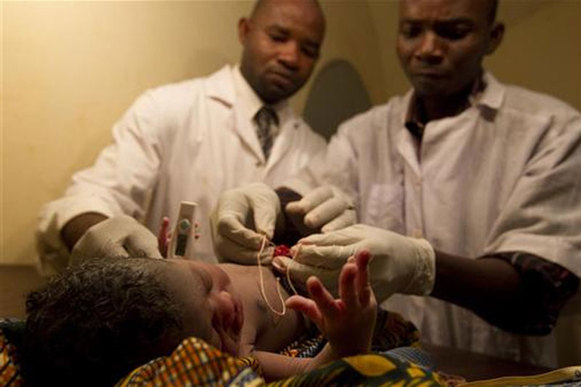UNICEF urges to end child nutrition crisis in the Sahel
 0 Comment(s)
0 Comment(s) Print
Print E-mail
China.org.cn, December 23, 2011
E-mail
China.org.cn, December 23, 2011
The head of the United Nations Children's Fund (UNICEF) called Thursday on the global community to take action to prevent one million children in the Sahel region of West and Central Africa from becoming severely malnourished.
 |
|
Malian infants have low birth weights, linked to inadequate maternal care, malnutrition and endemic poverty. |
"The region is vast, the challenge is great and the window is closing," said Executive Director Anthony Lake. "To prevent a wide-scale emergency in the Sahel, UNICEF and our partners in this effort must begin at once to fill the pipeline with life-sustaining supplies to the region before it is too late."
Mr. Lake stressed that a significant number of children in the Sahel already suffer from malnutrition, making them extremely vulnerable and susceptible to any reduction in the quantity and nutritional quality of the food they consume.The region is vast, the challenge is great and the window is closing.
He underscored the urgency to act before the ‘lean season' when food runs out due to inadequate rain or poor harvests, which can start as early as March in some of the countries across the Sahelian belt.
"Specially developed ready-to-use therapeutic foods are the best way to treat severe acute malnutrition among children under five so they have a chance to survive and recover," Mr. Lake said. "The biggest challenge we face now is getting sufficient amounts of these critical foods to children as the need increases in the coming months," he added.
"The children at risk today in the Sahel are not mere statistics by which we may measure the magnitude of a potential humanitarian disaster. They are individual girls and boys, and each has the right to survive, to thrive and to contribute to their societies. We must not fail them."
Earlier this month UNICEF appealed for $65.7 million to respond to the crisis. It is currently distributing emergency stocks in affected countries such as Niger, where an estimated 33,600 children under the age of five are at risk.






Go to Forum >>0 Comment(s)